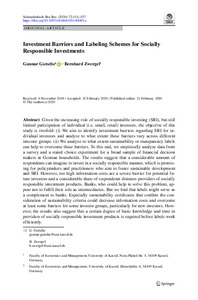| dc.date.accessioned | 2020-05-25T12:31:23Z | |
| dc.date.available | 2020-05-25T12:31:23Z | |
| dc.date.issued | 2020-02-21 | |
| dc.identifier | doi:10.17170/kobra-202005201283 | |
| dc.identifier.uri | http://hdl.handle.net/123456789/11571 | |
| dc.description.sponsorship | Gefördert im Rahmen des Projekts DEAL | |
| dc.language.iso | eng | |
| dc.rights | Namensnennung 4.0 International | * |
| dc.rights.uri | http://creativecommons.org/licenses/by/4.0/ | * |
| dc.subject | socially responsible investing | eng |
| dc.subject | survey | eng |
| dc.subject | discrete choice experiment | eng |
| dc.subject | labeling schemes | eng |
| dc.subject | investment barriers | eng |
| dc.subject.ddc | 330 | |
| dc.title | Investment Barriers and Labeling Schemes for Socially Responsible Investments | eng |
| dc.type | Aufsatz | |
| dcterms.abstract | Given the increasing role of socially responsible investing (SRI), but still limited participation of individual (i.e. small, retail) investors, the objective of this study is twofold: (i) We aim to identify investment barriers regarding SRI for individual investors and analyze to what extent these barriers vary across different investor groups. (ii) We analyze to what extent sustainability or transparency labels can help to overcome these barriers. To this end, we empirically analyze data from a survey and a stated choice experiment for a broad sample of financial decision makers in German households. The results suggest that a considerable amount of respondents can imagine to invest in a socially responsible manner, which is promising for policymakers and practitioners who aim to foster sustainable development and SRI. However, too high information costs are a severe barrier for potential future investors and a considerable share of respondents distrusts providers of socially responsible investment products. Banks, who could help to solve this problem, appear not to fulfill their role as intermediaries. But we find that labels might serve as a complement to banks. Especially sustainability certificates that confirm the consideration of sustainability criteria could decrease information costs and overcome at least some barriers for some investor groups, particularly for new investors. However, the results also suggest that a certain degree of basic knowledge and trust in providers of socially responsible investment products is required before labels work efficiently. | eng |
| dcterms.accessRights | open access | |
| dcterms.creator | Gutsche, Gunnar | |
| dcterms.creator | Zwergel, Bernhard | |
| dc.relation.doi | doi:10.1007/s41464-020-00085-z | |
| dc.subject.swd | Sozialverträglichkeit | ger |
| dc.subject.swd | Investition | ger |
| dc.subject.swd | Schätzung | ger |
| dc.subject.swd | Label | ger |
| dc.type.version | publishedVersion | |
| dcterms.source.identifier | EISSN 2194-072X | |
| dcterms.source.issue | Issue 2 | |
| dcterms.source.journal | Schmalenbach Business Review | eng |
| dcterms.source.pageinfo | 111-157 | |
| dcterms.source.volume | Volume 72 | |
| kup.iskup | false | |


